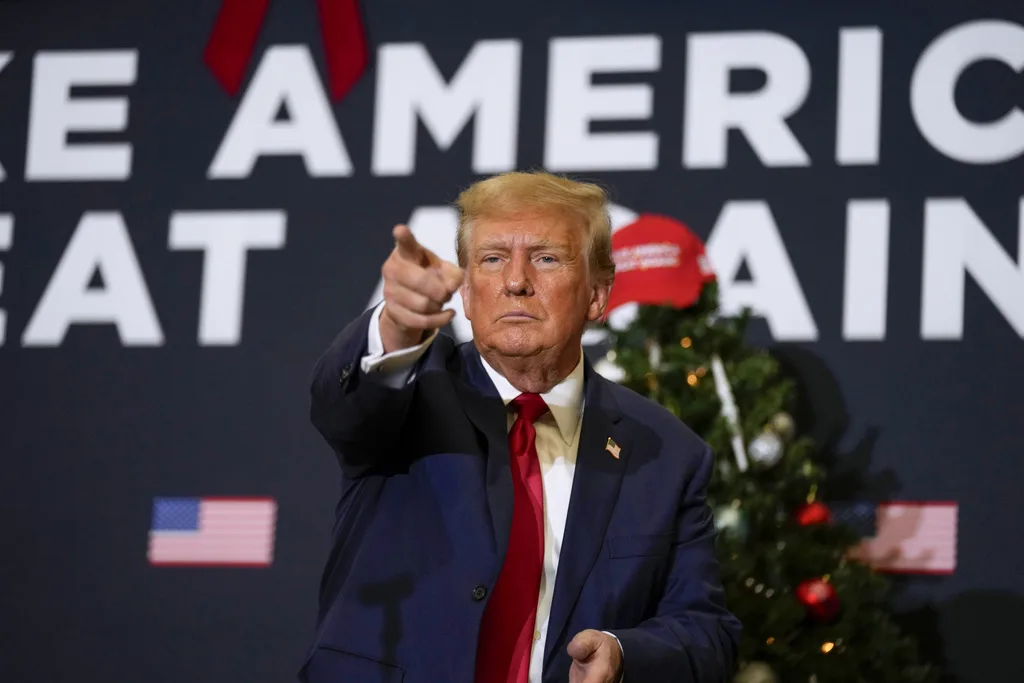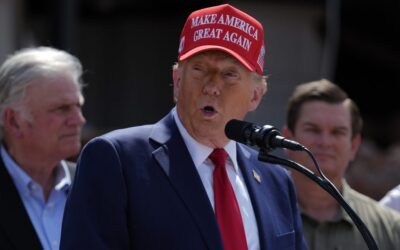
FILE - Former President Donald Trump points to supporters during rally Dec. 19, 2023, in Waterloo, Iowa. (AP Photo/Charlie Neibergall, File)
Saturday marks three years since a heavily-armed mob of supporters of outgoing President Donald Trump stormed the United States Capitol in an effort to block the certification of the 2020 presidential election results.
Lawmakers and staff barricaded themselves in offices while rioters pushed past Capitol police officers, ransacked the building, and vandalized the offices of some of the highest-ranked elected officials in the country. In the end, hundreds were injured and five people were killed, including one Capitol police officer: Brian D. Sicknick. He was beaten to death.
The effort to overturn the 2020 presidential election results was not spontaneous. For weeks, Trump urged his supporters to “Stop the Steal” and worked behind the scenes to try and overturn his defeat.
Three years later, the FBI has arrested upward of 1,200 people for their actions that day. Roughly 900 people have pleaded guilty so far. Trump himself has been indicted twice for his role in trying to overturn the 2020 election.
But he’s also faced virtually no political consequences for his actions. He is the frontrunner for the 2024 Republican presidential nomination and has openly embraced more extreme, authoritarian ideas on the campaign trail.
Here’s a quick recap of what Trump’s done since then—and what he’s planning to do in the future.
Trump and the ‘Big Lie’
Even though the insurrection failed, and Joe Biden did become president, Trump has never given up on the idea that the 2020 presidential election was stolen from him.
During the 2022 midterm elections, he endorsed Republican election deniers such as Doug Mastriano in Pennsylvania, Kari Lake in Arizona, and Tudor Dixon in Michigan, all of whom lost their respective races for governor.
In fact, of the nearly 300 election-denying candidates on ballots in 2022, Trump endorsed over 250 of them. The Center for American Progress’ analysis of the outcomes of those races suggests that “Americans in battleground states such as Pennsylvania, Michigan, and Arizona ultimately shunned election denialism when voting for offices with a responsibility to administer or oversee elections.”
While many election deniers were reelected or newly elected in less-competitive states or seats, the Center for American Progress’ analysis found that taken together, results of the 2022 midterm elections “suggest that Americans largely embraced traditional pro-democracy norms and elected candidates who have committed to defending elections against partisan interference.”
Trump Indicted in Four Criminal Investigations
Trump has also been indicted four times at the state and federal levels over the past year, and two of those indictments are directly related to his role in the plot to overturn the 2020 election results.
On Aug. 14, 2023, Trump was criminally charged in the state of Georgia over his efforts to overturn the 2020 election.
Trump was charged with 13 counts in this case, including a count of violating Georgia’s Racketeer Influenced and Corrupt Organizations Act (RICO), which calls for a minimum sentence of at least five years in prison and a maximum of up to 20 years in prison.
Trump is also charged with soliciting a public officer to violate their oath, conspiring to impersonate a public officer, conspiring to commit forgery in the first degree, and conspiring to file false documents.
Trump, along with 18 co-conspirators, is accused of orchestrating a “criminal enterprise” to reverse the results of the 2020 election in Georgia.
There’s also a federal inquiry into what happened in the two months between Election Day in 2020 and Jan. 6, 2021, when Trump schemed to overturn his loss.
In a 45-page indictment, Special Counsel Jack Smith laid out a mountain of evidence showing that Trump and his allies spread false information about voter fraud, urged Republican state officials to undermine the results of the election, assembled false electors, and pressured former Vice President Mike Pence to “unilaterally toss out the legitimate results.”
These actions culminated, prosecutors argue, in the events of Jan. 6, 2021.
The former president has denied wrongdoing in each case and insisted, despite mountains of evidence, that the charges are “fake.” He has also attacked prosecutors in both cases, calling Smith “deranged,” a “psycho,” and saying he “looks like a crackhead.” Trump has also called Fulton County, Georgia District Attorney Fani Willis a “racist” and a “monster.”
Trump is expected to face trial in both cases this year.
Openly Embraced Authoritarianism on the Campaign Trail
Despite his indictments, Trump has shown no signs of moderating. Instead, he’s openly moved even further right and embraced flat-out authoritarian ideas and rhetoric. Most notably, he’s ramped up his anti-immigrant agenda.
According to a report from The New York Times, the former president is planning to “round up” millions of undocumented immigrants already in the US and detain them in sprawling detention camps, separating them from their families before deporting them en masse.
Trump also wants to restrict all forms of immigration in a number of ways. He plans to revive his first-term border policies, which included banning entry by people from certain Muslim-majority nations and reimposing a COVID-19 era policy of refusing asylum claims. He also wants to screen visa applicants to prevent anyone with “undesirable attitudes” from being given a visa and end birthright citizenship for babies born in the US to undocumented immigrants, a move that is almost certainly unconstitutional.
Trump’s recent rhetoric has also grown more extreme.
In Nov. 2023, during a Veterans Day speech, Trump denigrated his opponents and critics calling them “vermin.” He also suggested that they pose a greater threat to the US than countries such as Russia, China, or North Korea.
This language received immediate criticism from historians, who compared it to that of other authoritarian leaders.
Ruth Ben-Ghiat, a historian at New York University, told the Washington Post that “calling people ‘vermin’ was used effectively by Hitler and Mussolini to dehumanize people and encourage their followers to engage in violence.”
Trump used similar rhetoric in an interview with National Pulse, a conservative media publication.
“Nobody has any idea where these people are coming from, and we know they come from prisons. We know they come from mental institutions and insane asylums. We know they’re terrorists. Nobody has ever seen anything like we’re witnessing right now,” Trump said. “It is a very sad thing for our country. It’s poisoning the blood of our country. It’s so bad, and people coming in with disease. People are coming in with every possible thing that you could have.”
Trump’s rhetoric about migrants “poisoning the blood of our country,” echoes Hitler’s Nazi propaganda used against immigrants, Jewish people, and interracial families.
In Chapter 11 of Hitler’s autobiographical manifesto Mein Kampf, titled “Nations and Race,” the dictator wrote that “all great cultures of the past perished only because the originally creative race died out from blood poisoning.”
Trump and Project 2025
Trump has also repeatedly vowed to enact revenge on his opponents and enemies if elected back to the White House in November. According to the Washington Post, the former president and his allies have begun mapping out specific plans for using the federal government to punish Trump’s critics and opponents.
For example, Trump wants the Justice Department to investigate one-time officials and allies who have been critical of his time in office, such as his former chief of staff John Kelly, former attorney general William Barr, his ex-attorney Ty Cobb, and former Joint Chiefs of Staff chairman Gen. Mark Milley. He also wants to appoint a special prosecutor to “go after” President Biden and his family.
But the former president’s plans go deeper than that.
A constellation of far-right organizations has drawn up Project 2025, a plan for Trump’s second term that would transform America into a far-right, Christian nationalist, militarized state.
Some of the proposals outlined in the nearly 1,000 page plan include firing at least 50,000 career civil servants and replacing them with MAGA loyalists, calling on the Department of Labor to explicitly give companies permission to discriminate against LGBTQ Americans, and allowing Trump’s Justice Department to take over local law enforcement if the president so chooses.
The plan also proposes further restrictions on abortion rights and birth control, outlawing pornography, stripping the FBI director of their independence, and more.
Looking Ahead
Trump is on track to run away with the Republican nomination. On Saturday, he will mark the third anniversary of Jan. 6 by hosting a “Commit to Caucus” rally in Iowa, just days ahead of the Jan. 15 Iowa Caucus.
From there, he’s expected to lock down the nomination—bringing a potential Trump term one step closer to reality.

Here’s what Trump promised to do on ‘Day One.’ Now that he and Republicans have total power in DC, will he?
The president-elect should be able to, in theory, implement his “Day One” plans. The big question is – will he actually do what he’s proposed? Or...

Youngkin to visit Trump in Mar-a-Lago
Virginia’s governor is joining other Republican governors from around the country for a visit with the president-elect. Virginia Gov. Glenn Youngkin...

Trump is widely expected to prematurely declare victory regardless of the vote count
Political experts and campaign officials alike are expecting Donald Trump to declare victory on Tuesday night before the final results will roll in....

Dozens of ex-Trump administration officials have spoken out against him or oppose his campaign
Dozens of former Trump administration officials — including his former VP Mike Pence, former Chief of Staff John Kelly, and two of his former...

Opinion: How Trump exploited a willing media to convince Americans that nothing matters
More than nine years after he launched his first campaign for president, much of the media continues to struggle with how to cover Donald Trump. In...

Trump’s former chief of staff says the former president praised Hitler and would rule like a ‘fascist’
“I need the kind of generals that Hitler had,” Trump reportedly said in a private conversation in the White House. And in an interview with The...




